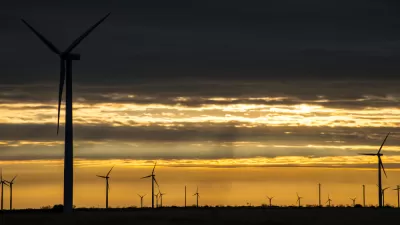Just over a year ago President Obama's draft Clean Power Plan was unveiled. That proposal has been finalized and the president promoted it at a press event on Monday. The final rule is both stronger and more lenient that the original proposal.
"The final rules propose a 32% cut in carbon emissions from power plants by 2030 on 2005 levels, up from the initial proposal of 30%," writes Adam Vaughan, editor of the Guardian's environment site. "However states will only have to comply by 2022 rather than 2020 as originally proposed, and will be able submit their plans on meeting the targets by 2018 instead of 2017."
This rule is aimed at existing power plants and is expected to have the greatest effect on coal-powered plants, though all fossil fuel plants will feel the pinch. Marty Durbin, chief executive of America's Natural Gas Alliance, a trade group representing natural-gas-producing companies, told The Wall Street Journal: "We’re disappointed and discouraged that they [the administration] seem to be ignoring the fact that natural gas has greatly reduced emissions."
Analysts at Sanford C. Bernstein & Co. said the rule would increase utility consumption of natural gas by 7.1 billion cubic feet a day, or 32%, enough to lift national demand for it by about 10%. The big loser—the coal industry—will see consumption drop 23% by 2020, adding to the crisis already rocking mining. Some opponents have labeled the rule a “war on coal.” [Wall Street Journal]
The real winner will be renewables which will get "a head start to wind and solar deployment," according to a White House fact sheet, by driving "more aggressive investment in clean energy technologies than the proposed rule, resulting in 30% more renewable energy generation in 2030 and continuing to lower the costs of renewable energy."
Cap-and-Trade
"A federal model, also expected to be released Monday, would be imposed on the power sectors in states that do not come up with their own plans," writes Alan Neuhauser for US News & World Report. States would be directed toward the two existing programs, the northeast Regional Greenhouse Gas Initiative (RGGI) and the California program.
The model would allow participation in regional cap-and-trade emissions programs, which reward clean-burning power sources by giving them credits they can then sell to heavy polluters.
While push-back that will undoubtedly result much litigation is already coming from coal interests, Vaughan writes that "hundreds of businesses including eBay, Nestle and General Mills have issued their support for Barack Obama’s clean power plan."
FULL STORY: Obama's clean power plan hailed as US's strongest ever climate action

Maui's Vacation Rental Debate Turns Ugly
Verbal attacks, misinformation campaigns and fistfights plague a high-stakes debate to convert thousands of vacation rentals into long-term housing.

Planetizen Federal Action Tracker
A weekly monitor of how Trump’s orders and actions are impacting planners and planning in America.

Chicago’s Ghost Rails
Just beneath the surface of the modern city lie the remnants of its expansive early 20th-century streetcar system.

Bend, Oregon Zoning Reforms Prioritize Small-Scale Housing
The city altered its zoning code to allow multi-family housing and eliminated parking mandates citywide.

Amtrak Cutting Jobs, Funding to High-Speed Rail
The agency plans to cut 10 percent of its workforce and has confirmed it will not fund new high-speed rail projects.

LA Denies Basic Services to Unhoused Residents
The city has repeatedly failed to respond to requests for trash pickup at encampment sites, and eliminated a program that provided mobile showers and toilets.
Urban Design for Planners 1: Software Tools
This six-course series explores essential urban design concepts using open source software and equips planners with the tools they need to participate fully in the urban design process.
Planning for Universal Design
Learn the tools for implementing Universal Design in planning regulations.
planning NEXT
Appalachian Highlands Housing Partners
Mpact (founded as Rail~Volution)
City of Camden Redevelopment Agency
City of Astoria
City of Portland
City of Laramie



























